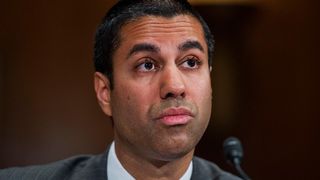Pai Proposes FCC Auction of C-Band

FCC chair Ajit Pai has decided to hold a public auction of C-Band spectrum.
That is the midband spectrum the FCC wants to free up for 5G, and that is the proposal that the chairman signaled Monday (Nov. 19) he would be asking the other commissioners to vote to approve in an order early next year.
Pai let that cat out of the bag on the upcoming item in letters to the Hill, which has been closely following the issue. The chairman also said the plan is to auction 280 MHz, which would be 300 MHz (of the 500 MHz in the band) minus a 20 MHz guard band.
Incumbent services will have to be repacked from the 500 MHz to the upper 200 MHz.
The other 200 MHz will be reserved for incumbent use.
The FCC will move directly to an order on the public auction approach, rather than a notice of proposed rulemaking with a notice and comment period. FCC officials speaking on background said that there would be comment sought on actual auction procedures.
Pai had signaled he wanted to vote on an item before the end of the year, so the Hill was on notice that a decision on a way forward was forthcoming. But that is now not happening.
Multichannel Newsletter
The smarter way to stay on top of the multichannel video marketplace. Sign up below.
The FCC is freeing up the spectrum for carriers to bid on as they role out 5G terrestrial broadband service.
Related: CBA's Pitsch Says FCC Auction Could Lead to Legal Delays
The debate has been whether to hold a public or private auction--the satellite operators currently providing broadcast and cable network program delivery services in the band have been proposing a private auction, most recently of 300 MHz, while cable ops had preferred a public auction of even more spectrum, and perhaps eventually all of it as they moved to fiber delivery.
"After much deliberation and a thorough review of the extensive record, I have concluded that the best way to advance these principles [significant amount, made available quickly, generate revenue for the government, protect incumbents] is through an auction of 280 MHz of the C-band conducted by the Federal Communications Commission's excellent staff," Pai said in a letter to Sen. Roger Wicker (R-Miss.). "That will leave 200 MHz for the delivery of network programming to broadcaster and cable operator clients."
Pai also tweeted about the item Monday:
[embed]https://twitter.com/AjitPaiFCC/status/1196468857025835009[/embed]
The C-Band Alliance (CBA), comprising the satellite carriers, had been arguing the chairman could get all those and still hold a private auction.
In a letter to legislators, many of which have pushed for an FCC auction, CBA executive vice president Peter Pitsch said that it is an FCC-run auction that is likely to prompt the delays in getting the critical midband C-Band spectrum into carriers' hands, delays while China was moving ahead in the race to 5G.
"Several parties, including the CBA, have raised concerns that the FCC lacks the authority to confiscate C-band spectrum without compensating the satellite operators that currently use the spectrum to deliver valuable services throughout the United States," said Pitsch. "Given this legal uncertainty, an FCC auction— which likely could not even be scheduled until mid-2021, at the earliest—is bound to be delayed by protracted litigation, slowing the transition of critical C-band spectrum for 5G operations."
The Pai proposal came about the same time that Sens. Roger Wicker (R-Miss.), chairman of the Senate Commerce Committee, and Sen. John Thune (R-S.D.), chairman of the Communications subcommittee were announcing a bill to require the FCC to: "conduct a public auction of C band spectrum"; "start [the auction] no later than Dec. 31, 2020'; "to make available at least 280 MHz of spectrum"; and "to capture for the taxpayer at least 50% of the fair market value of the spectrum."
Senior FCC officials said they expected the auction would indeed begin before the end of 2020.
They were tough on the C-Band Alliance proposal, saying any C-Band Alliance private auction will not bring spectrum to auction in a fair and transparent way, and would instead facilitate backroom deals.
They said that nobody at the White House has expressed any view on whether the FCC should hold a public or private auction. But they did confirm that the President did call Pai on Oct. 30 to ask about the proceeding. Pai expressed his four principles, but the President did not suggest what the FCC should do.
They said the suggestion the President's call influenced the outcome was a transparent attempt to distract from the flaws of the C-Band Alliance.
They also said they anticipate the FCC will vote on an order early next year.
Competitive Carriers Association President Steven K. Berry liked what he saw in the Wicker-Thune bill, though at press time he had not commented on the Pai proposal.
“The 5G Spectrum Act clearly has the public interest in mind by ensuring at least fifty percent of the auction proceeds are reserved for American taxpayers," he said. "The C-band spectrum is a taxpayer-owned resource, and it only makes sense that a significant portion of the proceeds benefit the U.S. Treasury or are otherwise used as directed by Congress. It is a good day for consumers, competition and the economy, and I thank Senators Wicker and Thune for their work on this important issue.”
Contributing editor John Eggerton has been an editor and/or writer on media regulation, legislation and policy for over four decades, including covering the FCC, FTC, Congress, the major media trade associations, and the federal courts. In addition to Multichannel News and Broadcasting + Cable, his work has appeared in Radio World, TV Technology, TV Fax, This Week in Consumer Electronics, Variety and the Encyclopedia Britannica.

